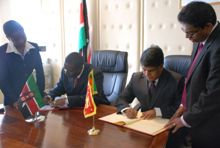
Recently Sri Lanka and Kenya concluded a Bilateral Air Services Agreement in Nairobi. While Sri Lanka High Commissioner for Kenya J.P.B. Dissanayake signed on behalf of Sri Lanka, Amos Kimunya, Minister of Transport of Kenya (former Trade Minister) signed the Agreement for Kenya. This is also an outcome of talks between former Prime Minister Ratnasiri Wickramanayaka, and President Mwai Kibaki in May 2009.

Recently Sri Lanka and Kenya concluded a Bilateral Air Services Agreement in Nairobi. While Sri Lanka High Commissioner for Kenya J.P.B. Dissanayake signed on behalf of Sri Lanka, Amos Kimunya, Minister of Transport of Kenya (former Trade Minister) signed the Agreement for Kenya. This is also an outcome of talks between former Prime Minister Ratnasiri Wickramanayaka, and President Mwai Kibaki in May 2009.
Diplomatic relations between Sri Lanka and Kenya was established in 1970. Nairobi continues to be the primary communication and financial hub of East Africa. It enjoys the region’s best transportation linkages, communications infrastructure, and trained personnel. Therefore, Sri Lanka expected to use Kenya as an entry point into the East African market and boost its export that has been in favour of Kenya. Currently, there are about 10 Sri Lanka Textile Firms, operating Kenya’s Export Possessing Zones (WPZs) and several other IT firms.
This Agreement led the framework for direct access to the two economies. It provides unrestricted number of flights from any part of Kenya to any part of Sri Lanka and vise versa and also for code sharing arrangement, where two airlines can share the same flight. For instance, a seat can be purchased on one airline, but it is actually operated by a co-operating airline under a different flight number or code from either of the two countries.
After the signing ceremony, Hon. Kimunya stated that “Sri Lanka imports Kenyan tea for blending purposes and this agreement can only serve to increase Kenya’s tea export as well as provide room for blending in the country.” Sri Lankan tea and Kenyan tea are blended at a ration of 35 and 65 per cent respectively. However, the Transport Minister does not see this agreement as a threat to Kenyan tea as Sri Lanka is also an importer of Kenyan Tea. Although Sri Lanka is a major exporter of tea, it also imports small quantity of tea from other countries in order to blend the foreign imported teas with Sri Lanka teas for export. This is the reason for Sri Lanka to import tea from Kenya.
There are other products such as natural rubber, pneumatic tyres used on bicycles, raw coconut coir, cotton, sewing thread of synthetic staple fibers, woven clothing, special woven & tufted textile fabrics and sacks and bags where Sri Lanka can make efforts to increase the volume of imports of these items by Kenya, through usual export promotional events, market surveys, participation in trade fairs and visits by business delegations.
Three are number of Kenya students who have trained various Sri Lankan Academic Institutions through the Commonwealth Scholarship Scheme and this Agreement would make them easier to reach Sri Lanka.
This Agreement led the framework for direct access to the two economies. It provides unrestricted number of flights from any part of Kenya to any part of Sri Lanka and vise versa and also for code sharing arrangement, where two airlines can share the same flight. For instance, a seat can be purchased on one airline, but it is actually operated by a co-operating airline under a different flight number or code from either of the two countries.
After the signing ceremony, Hon. Kimunya stated that “Sri Lanka imports Kenyan tea for blending purposes and this agreement can only serve to increase Kenya’s tea export as well as provide room for blending in the country.” Sri Lankan tea and Kenyan tea are blended at a ration of 35 and 65 per cent respectively. However, the Transport Minister does not see this agreement as a threat to Kenyan tea as Sri Lanka is also an importer of Kenyan Tea. Although Sri Lanka is a major exporter of tea, it also imports small quantity of tea from other countries in order to blend the foreign imported teas with Sri Lanka teas for export. This is the reason for Sri Lanka to import tea from Kenya.
There are other products such as natural rubber, pneumatic tyres used on bicycles, raw coconut coir, cotton, sewing thread of synthetic staple fibers, woven clothing, special woven & tufted textile fabrics and sacks and bags where Sri Lanka can make efforts to increase the volume of imports of these items by Kenya, through usual export promotional events, market surveys, participation in trade fairs and visits by business delegations.
Three are number of Kenya students who have trained various Sri Lankan Academic Institutions through the Commonwealth Scholarship Scheme and this Agreement would make them easier to reach Sri Lanka.
Sri Lanka High Commission
Nairobi, Kenya
Please follow and like us:




